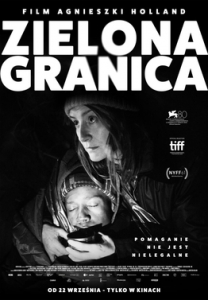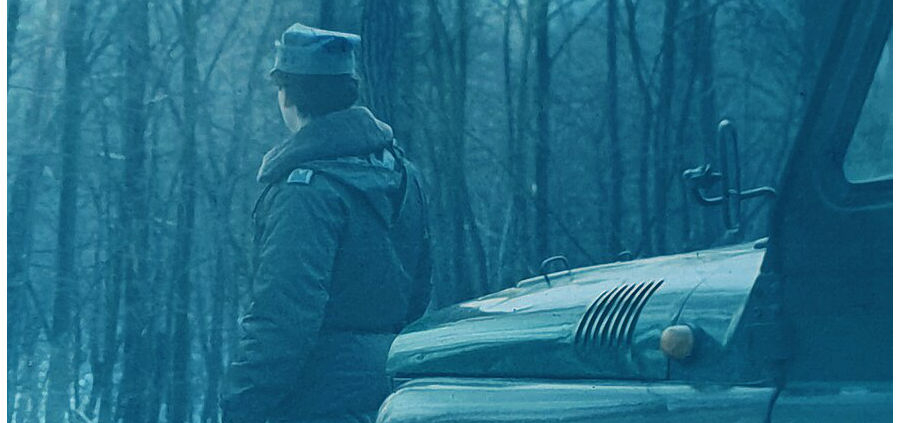Notes from a State of Exception: On Agnieszka Holland’s “Green Border” by Jeannine M. Pitas
The camera scans a vast expanse of green forest. Then, the image changes to black and white. Words appear, a time and place: Belarus, October 2021. We’re on a plane, a Turkish airline about to land in Minsk. People come into focus: a bearded man and a dark-haired woman, the man’s elderly father, two small children and a baby. Eventually, we will learn that they are from Syria, fleeing from ISIS and Basher al-Assad. We see a kind-faced woman with wavy black hair and glasses. We will learn that she is from Afghanistan, she has no family, she only saw two options—to wait for the Taliban or flee. The captain welcomes the passengers to Belarus. A flight attendant gives everyone a smile and a rose.
Then, we cut to a minibus parked outside, into which the newly arrived refugees crowd. They’ve been told they’ll be taken to the border with Poland and given safe passage into the European Union. Hours later, only after they are violently dropped off in a remote patch of green forest, ordered to run over a section of barbed wire fence that has been knocked down, and left to fend for themselves, do they—and we—realize that they have been lied to.
When they are ultimately intercepted by Polish border guards, violently corralled into a vehicle, and returned to the Belarussian authorities, we realize their true predicament: they are pawns in a cruel political game, lured by Belarussian dictator Alexander Lukashenko with false promises of safe passage into the EU, then caught in a dangerous strip of land—what the Poles call Stan Wyjątkowy, the state of exception—where they are passed between the two borders like a soccer ball. While some receive help from young activists bearing food, warm clothes, and power banks for their phones, they are not given transportation or travel directions.
 These scenes are the backbone of iconic Polish filmmaker Agnieszka Holland’s latest offering, Green Border (2023). While not a documentary, the film was based on hundreds of hours of document analysis and interviews with refugees, border guards, and Polish-Belarussian borderland residents. It starts with the situation of immigrants, then cuts to the story of a border guard who grows increasingly uneasy with the work he is doing, then to the activists, and then to a psychologist who, recently widowed and relocated to the northeastern region of Poland, learns that the political is indeed personal when she is suddenly awakened to the cries of the Afghan woman trapped in a nearby swamp. This structure—organized much like a five-act play—seeks to portray a cross-section of Polish society, suggesting that no one is unaffected by this reality.
These scenes are the backbone of iconic Polish filmmaker Agnieszka Holland’s latest offering, Green Border (2023). While not a documentary, the film was based on hundreds of hours of document analysis and interviews with refugees, border guards, and Polish-Belarussian borderland residents. It starts with the situation of immigrants, then cuts to the story of a border guard who grows increasingly uneasy with the work he is doing, then to the activists, and then to a psychologist who, recently widowed and relocated to the northeastern region of Poland, learns that the political is indeed personal when she is suddenly awakened to the cries of the Afghan woman trapped in a nearby swamp. This structure—organized much like a five-act play—seeks to portray a cross-section of Polish society, suggesting that no one is unaffected by this reality.
The film is painful to watch and contains horrible cruelties: the merciless beating of an old man, the image of a pregnant woman being thrown over a fence, the image of a Belarussian border guard demanding fifty Euro of a refugee for a bottle of water then dumping it on the ground before her. “If you came to our house, we would welcome you,” the Syrian father of the family shouts in Arabic to the Polish guards, who in a moment of total disconnection laconically respond, in Polish, “Sorry, I don’t understand you.” We are shown the Polish guards’ training, in which the commanding officer asserts, “These are not people. They are simply weapons Putin and Lukashenko are using against us.”
Nevertheless, the horror is relieved by moments of humor and beauty—like when the Syrian family’s young boy tells one of the activists that he saw a giraffe in the forest, or when two teenage boys from an unnamed French-speaking African country, taken in by an upper-class Polish family, engage in a freestyle hip-hop with that family’s children. These scenes show that hope, humanity, and kindness can still be found amid human cruelty. But these flashes of hope accompany tragic images of people who don’t make it—of a border security vehicle waiting outside a hospital to arrest the Afghan woman rescued from the swamp as soon as she is well enough to leave.
Based on an ongoing crisis, Holland’s film drew much ire from Poland’s right-wing government under the Law and Justice Party. Polish Minister of Justice Zbigniew Ziobro compared it to a Nazi propaganda film; a review-bombing campaign was organized, and the Polish judging committee for the Academy Awards in the category of Best International Feature Film chose not to nominate it as Poland’s submission. Yet the film was seen by many, and some commentators suggest that it may have had a hand in tipping the balance in Poland’s 2023 parliamentary elections away from Law and Justice and toward the centrist Civic Platform. Best known for her poignant depiction of a young Jewish man who survives World War II in her 1990 film Europa Europa, Holland is widely respected in Poland—something of a national treasure. Even in her country’s current politically polarized environment, her iconic status drew enough of a crowd to move the political needle.
Watching the film, I wondered what would happen in the US if a similar movie were made about our southern border—or what will happen when Holland’s film, currently touring the festival circuit, receives a wider US release. Unfortunately, I doubt that the impact will be the same. The US audience for this kind of film is largely people like me: highly educated and at least somewhat sympathetic to the realities of immigrants. Would my parents—who voted for Donald Trump twice and get almost all their news from Fox—attend such a film? Probably not. Learning of the film’s impact on Polish politics reminded me of Audre Lorde’s phrase, “Poetry is not a luxury.” Art holds the power to call people to action and make real change—but only when we are open to receiving it.
One of the most powerful scenes in the film occurs when the psychologist, after deciding to collaborate with the human rights activists, is stopped on the road by a border guard. Noting her dark hair and complexion, the guard asks her if she speaks Polish. Initially, she does not answer, provoking the guard to further questioning. In response, she and the other activist recites the words that everyone in Poland—which is one of the most heavily Catholic countries in the world—knows: “Our father, who art in heaven, hallowed be thy name.” When the guard interrupts and tells them to stop, they carry on, their prayer overpowering his barking call for silence.
A core tenet of Christianity, particularly in the form of Catholic Social Teaching, is its emphasis on human dignity. A basic principle is that human beings have the right to choose where they live; they have the right to move in pursuit of freedom, security for themselves and their families, and opportunities to work. I remember hearing much about the need for mercy and dignity when, in 2016, I attended the Catholic festival of World Youth Day in Poland, where Pope Francis urged us to show mercy to all. I remember attending an outdoor Stations of the Cross where, for each station, we were shown images of Polish charitable organizations engaged in humanitarian work throughout their country.
These principles of mercy and human dignity appear to have been forgotten by some of Poland’s leaders, whose handling of the Belarussian border crisis reeks of racism and Islamophobia (we especially see this in the film’s final scene, which shows the warm welcome the Polish government offered to Ukrainian refugees when the war began there in February 2022). It has also been forgotten by many self-professed US Christians who dehumanize and demonize the refugees at our southern border.
The geopolitical problems that cause widespread migration are vast and multifaceted, and there are no simple solutions. But Holland’s film seeks to remind us of a simple truth: people who migrate are fleeing terrible situations. If we were in their position, we would surely do the same. Despite our cultural differences, all humans are the same in our basic needs, desires, and dignity. As we see with the border guard who, increasingly disturbed by the work he does, indulges in excessive drinking, when we dehumanize others, we ultimately dehumanize ourselves.
For me, the basic right of people to move has always been self-evident. Maybe this is due to my own identity as a descendent of Polish immigrants who, fleeing colonialism and poverty in the 19th century, made the US their home. When Donald Trump was elected in 2016, I was living in a small Iowa town where immigrants from Guatemala—many of them unaccompanied minors—had fled economic hardship and gang violence to start a new life. As a bilingual Spanish-English speaker, I began interpreting at legal and medical appointments and eventually came to serve as a legal guardian for three of them as they sought legal status in the US. One of them lived with me for two years. While some people in my life praised me as exceptional, I just wanted to be normal. Many others in my community were doing the same. Together, we became part of a movement that was building in big cities and small towns across the US to affirm immigrants’ rights.
Ultimately, the border guard in Holland’s film realizes that, even while working in a cruel system, he can choose to show compassion. The psychologist discovers that she can use her emotional strength to save lives. Her wealthy patient learns that, as disgusting as he finds the fascist movements in his country, he can offer short-term or long-term housing to migrants in transit. These characters—who, though fictional, are based on true stories—offer inspiration to anyone seeking to make a difference. No matter how small or powerless we may feel, and no matter who wins the upcoming US presidential election at the end of this year, we can always choose to affirm the basic dignity of all. ♦
Jeannine Pitas is a teacher, poet, scholar, freelance journalist, book reviewer, and the Spanish-English translator of several Latin American writers. Her translation of I Remember Nightfall by Uruguayan poet Marosa di Giorgio was shortlisted for the 2018 National Translation Award given by the American Literary Translators’ Association. A graduate of University of Toronto’s Centre for Comparative Literature, she currently lives in western Pennsylvania and teaches literature and writing at Saint Vincent College. Or/And, her second full-length collection of poetry, is available from Paraclete Press.





Leave a Reply
Want to join the discussion?Feel free to contribute!